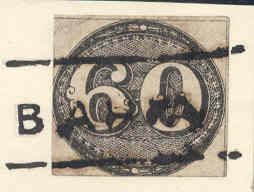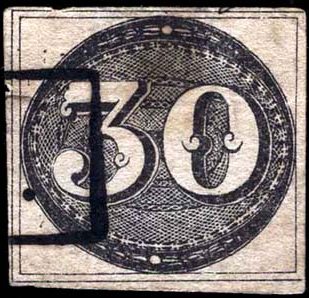 |
|||||
|
|||||
| Preview of Stamps Catalogue: VOLUME 2 |
 |
|||||
|
|||||
| Preview of Stamps Catalogue: VOLUME 2 |
Note: on my website many of the
pictures can not be seen! They are of course present in the catalogue;
contact me if you want to purchase the catalogue.
Giovanni Patroni was a stamp forger. He was born in Italy, later lived in London, British West Indies and Philadelphia (source: 'Philatelic Forgers, their Lives and Works' by V.E.Tyler). He did business under the names 'Cosmopolitan Stamp Co', 'National Stamp Co' and 'Stanmore, Lex & Co' (same source) and other names according to The American Journal of Philately (see below). After he almost got convicted for stamp forgery in Philadelphia after which he left for South America. His address in Philadelphia was 746, S.4th Street, Philadelphia (in 1868).
He has forged stamps of Nicaragua in 1875 (postal forgeries, source: V.E.Tyler) for which he got arrested. See later in this document an article reproduced from 'The Philatelist Vol X' 1876, page 11.
According to Tyler he made forgeries of Angola, Baden, Brazil, British Guiana, Cuba, Cundinamarca, Ecuador, French Colonies, Hanover, Hyderabad, Iceland, Japan, Luxembourg, Nicaragua, Pacific Steam Navigation Co, St.Thomas and Prince, Tolima etc. If anyone has more information, please contact me.
Patroni forgeries of the first issue of Brazil:

I've been told that this 60 r stamp with cancel 'BAHIA' between
two horizontal lines is a Patroni forgery.



The left bottom part of the '3' is not forked as in the genuine
stamps; the top part of the '3' does not have any curl; possibly
a Patroni forgery
According to the information on http://jfrubel.home.mindspring.com all three values were forged by Giovanni Patroni. They first appeared around 1897 and always(?) have the above "BAHIA" cancel. In the 30 r, the '3' and '0' are larger. Similar for the 90 r, where the '9' and '0' are larger. The side ornaments in the 60 r are smaller than in the genuine stamps.
In 46th Congress 2nd session, house of representatives Januray 13, 1880, "Use of the mails for lottery purposes (and other schemes to defraud the public)", "list of persons conducting fraudulent lotteries", page 3, the Cosmpolitan Stamp Company, alias Philadelphia Stamp Co, Giovanni Patroni is listed with the date of order Oct.22 1875, and place of business: Philadelphia, Pa and Camden N.J.
The following text was found in The Philatelist Vol X' 1876, page 11 in which Patroni is identified as Petroni concering the arrest of Patroni in Philadelphia. This text can also be found with Google Books.
GOOD NEWS FOR STAMP COLLECTORS.
An article in the Philadelphia Times, after preambling that the
collection of home and foreign postage stamps has of late years
assumed considerable proportions, &c., proceeds to state that
certain individuals have found it profitable to manufacture
counterfeits, for the sole purpose of disposing of them to
collectors, or to the stores where such things are vended. It
seems that a law exists in the United 12 Advice to Those About to
Collect, States to the effect, " That any person who shall
forge or counterfeit postage stamps of any foreign government,
shall be deemed 'guilty of felony ; and on conviction thereof,
shall be punished by imprisonment of not less than two nor more
than ten years, at the discretion of the court."
In consequence of information laid, an office at 135, South Fifth
Street, was entered, and forgeries purchased by a detective
agent. Lithographic stones, perforating machine, and printing
press, Petroni, and James
Davidson, were all seized together, at 2,003, North Fourth
Street. Counterfeits were found at 513, Vine Street, and a man
named Wilson apprehended there. Petroni,
who pleaded innocence of any intention to violate the law, was
placed with Wilson under 2,500 dollars bail each; and Davidson,
the smaller sum of 1,000 dollars.
Means for forging the impressions of Nicaragua, Greece, Guiana,
Baden, Angola, Canada, Hanover, Roumania, Japan, Austria, and the
Argentine Republic, were found. The swindlers, having carried on
their nefarious trade on both sides of the water, if they escape
justice in Philadelphia, by any technical quirk, will give their
accusers opportunity of amending the indictment in New Jersey. We
cordially hope they will get their deserts ; and that similar
proceedings will be instituted here, and in Switzerland and
Germany.
On page 22 of this journal the story continues as (mentioning the correct name of Patroni):
GOOD NEWS FOR STAMP COLLECTORS.
UNDER this heading appeared last month an account of the
apprehension of a certain G. Patroni and
others for forging postage stamps. We regret to say that,
evidently in consequence of the incorrect wording of the
indictment, the gang was let off.
A very garbled statement of the matter in The American Journal of
Philately gives a contrary view. It is headed " Convicted of
Selling Counterfeit Foreign Stamps," followed in capitals by
"Two Years in State Prison." This has deceived two of
the foreign magazines already, and probably all who have not been
favoured like ourselves with a correct account of the
extraordinary and amusing proceedings, which afford a strange
idea of the official knowledge of equity, geography, and polity
in the United States.
The actual fraud of the accused was that of obtaining money under
false pretences; whereas the indictment against them was that of
attempting to defraud the governments of Nicaragua, Egypt,
British Guiana, Angola, and St. Thomas and Prince Islands.
Nicaragua was first taken in hand. A young dealer owned to
purchasing a dozen of the 1 centavo stamps for 30 cents. This
admission was fatal; because selling 12 cents worth of stamps for
30 cents evidenced no intention to cheat the Nicaraguan
government.
Egypt stood next in the arraignment ; but the judge decided that,
as the stamps of Egypt bore certain hieroglyphics which neither
himself nor the jury could read, and consequently could not
distinguish the false from the true, that charge must be
abandoned!
Similar good luck befel the prisoners in the case of British
Guiana, for the astounding reason "that the government of
British Guiana, it being a colony, was not recognisable in that
Court, which knew no such government, it being a part of England
only ; and he should as soon think of recognising the officer of
an English county, or the mayor or alderman, or governor of
London ! " Our informant adds that this was a fine point ;
but good law, until reversed by the Supreme Court.
Angola followed suit ; but the judge owned his ignorance of such
a locality, and that both the place and its stamps must be proved
to exist before he could allow it on the record ! The attorney
for the prosecution had no witnesses who could prove of their own
knowledge anything about it; and hearsay evidence and books were
inadmissible in a criminal court ; and all books but stamp books
were silent as to the stamps of Angola. The Portuguese government
could have been communicated with, but documentary evidence was
not allowed ; and as Patroni
had pleaded, no adjournment could take place without his
permission!
St. Thomas and Prince Islands were likewise dismissed ; for had
even the existence of these and the preceding place been
admitted, as colonies they fell under the same category as
British Guiana, being alike devoid of a recognisable government!
Mr. Scott, of New York, states
that he swore that he had been in the stamp business since 1860,
and that the stamps purchased from Patroni were printed from the
lithographic stones in court. He added that the stamp business
extended to all parts of the civilized world, and estimated the
number of collectors in the United States at 200,000, whose
collections varied in value from five to fifty thousand dollars
each!
For the defence, Mr. S. Allan Taylor
attested that he kept counterfeit stamps, and had done so for
years; that their sale was common ; that he was still in the
business, and had received from Patroni similar counterfeits to
those in court! The counsel for the prosecution was staggered at
this, as well he might, and elicited from the witness on
cross-examination that he made his living by making, keeping, and
selling forged stamps!
After all this judicial farce, the judge charged the jury, and
said these the stamps of Nicaragua might have been used to
defraud the government; and that although there was no evidence
to prove criminal intent, it was still illegal to make them. The
jury took three hours' consideration, and handed in a sealed
verdict of guilty, with recommendation to mercy. The prosecuting
attorney, thereupon, declined to move for a sentence, and Patroni
was discharged. One of his companions being under accusation of
some other iniquity was not tried ; and the engraver of the
falsities was let off on pleading his ignorance of their intent
to deceive.
The judge, though unwilling to pronounce sentence, approved of
the verdict, because if the prisoner was acquitted, other
individuals might forge the stamps of England, France, and
Germany (which he actually condescended to consider governments),
and defraud them, citing the result of this trial as a precedent
were the verdict otherwise.
We hope some measures will be taken on this side the Atlantic to
stop the infamous trade in forgeries, which has done so much harm
to philately, and disgusted many a collector into giving up his
album. Our informant caps his account by the remark that the said
Patroni is a very gentlemanly man — very likely — so
was Wainwright — so also was Thomasen — so most
probably are Engelhardt Fohl of Riesa, Heinrich Baumer
of Olten, and others of the same nefarious type.
Note that Scott and S.Allan Taylor were at this court case, persons who themselves were also stamp forgers..... Some confusion seems to have existed in the philatelic press if he was really convicted or not, but this does not seem to have been the case.
In The American Journal of Philately of
November 20, 1875, page 160 the following text is found (can also
be downloaded with http://www.archive.org):
Good News for Collectors. A NEST OF COUNTERFEITERS ARRESTED.
For some time past numerous well executed counterfeits of the
stamps of Iceland, Japan, La Guira,
&c, have found their way into the stocks of retailers and the
albums of collectors ; we had but little difficulty in tracing
all these frauds to Philadelphia, or Camden, N. J., and soon
found out that they were being systematically distributed by a
well organized gang of scoundrels, who at length became so bold,
that the government determined to prosecute them under the act
confirmed June 8th, 1872. Sec. 179.....
The story continues on page 180 of The
American Journal of Philately (December 20, 1875):
Convicted of Selling Counterfeit Foreign Stamps. TWO YEARS IN
STATE PRISON'.
Monday the Twenty-ninth of November will be remembered as a red
letter day by all honest Philatelists, for on that day in the
United States District Court before Judge Cadwalader, Giovani
Patroni was convicted of making and selling counterfeit foreign
postage stamps, thus conclusively settling the fact that it is
against the law to make or sell imitations of foreign stamps, the
lowest penalty attached to the crime being two years in State
Prison.
In this case tried in Philadelphia, Nov. 29th, the first witness
called for the prosecution was Charles B. Barrett, who testified
to visiting the prisoner at several places where he did business
under various names, (G. Patroni, G. Perkins
& Co. Charles Corvini & Co. Cosmopolitan Stamp Agency,
Philadelphia Stamp Agency, Camden Stamp Agency, Stanmore Lex
& Co.) and also to taking him into custody
and seizing an immense quantity of counterfeit stamps,and the
lithographic stones and other implements, used in their
manufacture. This witness was corroborated by John Fay, a special
agent of the post office department who assisted in making the
arrest.
The Postmaster of Philadelphia testified to letting Patroni a
box in the post office, and that he stated that he was in the
Jewelry business. Samuel W. Heins related how he purchased some
counterfeit stamps of Nicaragua, Angola and other countries from
Patroni, under instructions from the special agent of the
department, and identified some stamps produced as those he
purchased.
J. W. Scott, of New York, was
called as an expert to prove the character of the stamps in
court, he testified that he had been in the stamp business since
1860, and was well acquainted with all foreign stamps, he swore
that the stamps purchased by Heins from Patroni were printed from
the lithographic stones in court, and that they were excellent
counterfeits of the genuine stamps.
On cross-examination by the prisoner's council as to the extent
of the stamp business, he stated that it was very large, and
extended to all parts of the civilized world and estimated the
number of collectors in the United States at 200,000, whose
collections varied in value from five dollars to fifty thousand
dollars each.
This closed the case for the Government.
On behalf of the defense, S. A. Taylor was
called to testify to the fact, that counterfeit foreign stamps
had been largely sold in this country for many years. After a
cleigyman had been called to prove previous good character the
defense rested. The counsel on both sides having addressed the
jury, the judge summed up the evidence and left the case with the
jury, with permission to return a sealed verdict, which they
agreed on after three hours deliberation.
Court being called to order in the morning, the jury handed in
their verdict which was guilty, with a recommendation to mercy.
The prisoner was then remanded for sentence; of the other two who
were arrested with Patroni, Wilson having since been convicted of
another crime was not tried on this charge. Davison who appears
to have been the artist, employed to engrave the stones, was
totally ignorant of the use to which they were to be put so he
was not brought to trial.
At the close of the case the District Attorney stated it to be
the intention of the government to prosecute all persons dealing
in counterfeit stamps, this will effectually put an end to this
nefarious traffic, and we shall be obliged to any of our friends
who will forward information of any persons in their vicinity who
deal in counterfeits, that we may at once lay the particulars
before the proper authorities.
One very important piece of information was brought out on the
trial, to which we wish to call particular attention, Patroni in
his endeavors to conceal his identity, did business under several
distinct names, nearly all of which were taken in imitation of
incorporated companies as the "Philadelphia Stamp Agency,
&c." We have repeatedly warned our readers of this class
of dealers, and cautioned them to have nothing to do with any
parties who do not carry on business in their own name, any
person concealing his name must have a reason for it, and that
reason in nine cases out of ten, is, that he either intends to
sell you counterfeits or else keep your money and make no
returns. Therefore, we say have no dealings with any one who
trades under a false name or does not give an address where he
can be found.